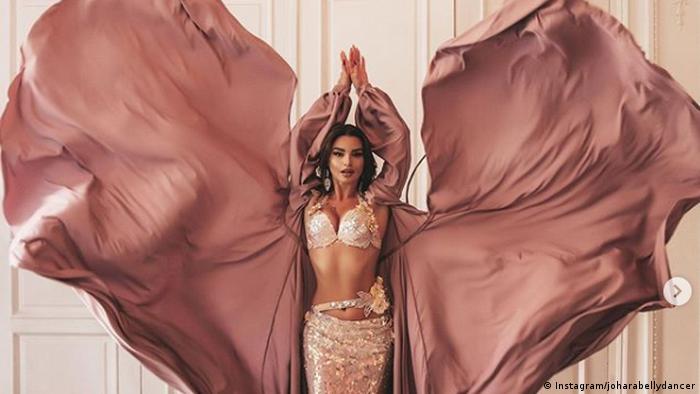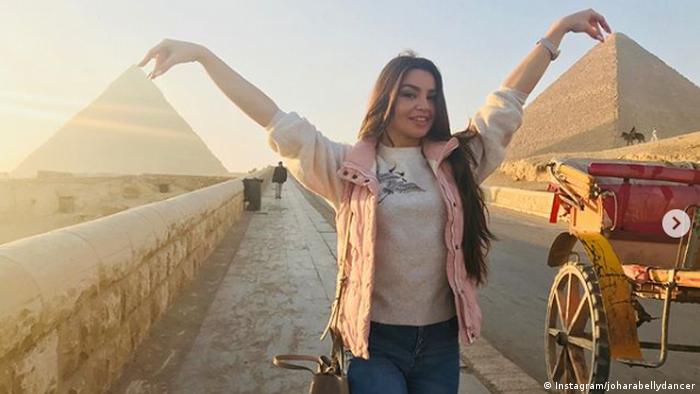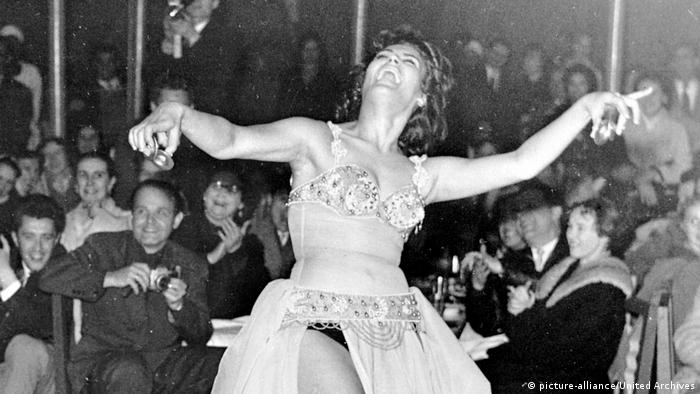Egypt may be the cradle of Arabic dance, but homegrown talent has become hard to find. That’s why today many of the most successful belly dancers come from abroad, like Johara a.k.a. Ekaterina Andreeva.

Johara — “jewel” in Arabic — is one of the most sought-after belly dancers in Cairo. She has one million followers on Instagram and her calendar is filled with bookings at parties, clubs and for weddings in expensive hotels. In one of her latest videos, the 31-year-old dances in a colorfully fitted costume: a silk bra, decorated with long glittering chains, and a skirt with a slit up the side revealing her long leg. Her dark hair falls to her hips and with every movement her jewelry jingles to the rhythm of the music. She is surrounded by a crowd and all eyes are on her — men and women film her with their phones as they sway to the tune.
Johara is actually called Ekaterina Andreeva and comes from Russia. For several years now she has been living and working in Cairo, the home of belly dancing. How does a Russian come to perform traditional Arabic dance in Cairo — and have such success with it?
Andreeva started dancing at the age of three — ballet, ballroom, Latin American styles. At 13, she lost her dance partner — typical in Russia, she says. Male dance partners are hard to come by and are frequently “pinched” by other dancers. It may have been a stroke of luck for Andreeva.
A Brazilian soap opera was the key to her finding her way back to dancing. “The Clone” aired on Russian TV in 2001 and became a massive hit. Russian viewers were inspired by Jade, the main character, who came from Morocco and impressed them with her belly dance skills. Suddenly there were classes everywhere, Andreeva recalled, including at the gym where she tried belly dancing for the first time. It was perfect for her since she didn’t need a partner. She chuckled as she related how her mother said it suited her well because she had not danced for a while and had gained a bit of weight.
In the beginning she mainly danced at her father’s restaurant. After learning the basic techniques, she taught herself the rest. Soon she began winning championship titles and opened her own belly dance studio in Moscow. At the same time, she was busy completing degrees in PR management and English-Russian translation, but already then she knew: “Dancing is my whole life.”

But she felt that in Russia belly dancing was first and foremost about earning money, and the artistry involved was incidental if not irrelevant. That’s different in Egypt, where belly dancing is a way of connecting art and culture. So she decided to leave her home and build a new dance career in the Egyptian capital.
Traditionally Cairo is the home of Arabic dance, where great belly dancers, such as Nagwa Fouad, apparently Henry Kissinger’s favorite, have learned the art and performed. Legendary dancers such as Dina Talaat Sayed and Fifi Abdou are still loved and admired by many. But nowadays it is mostly foreign — and above all Russian — dancers who are in high demand.

“The old generation of Egyptian belly dancers, well, they are getting old,” says Hany Rasem, a Cairo wedding planner who regularly books belly dancers. “There is simply no new generation coming from Egypt that is as good.” Foreign dancers like Andreeva fill the gap. Some days she attends up to five weddings.
Frequently her audience does not even notice she’s Russian: “Because it’s not our culture, we are more careful,” she said about herself and her colleagues. It’s important to her that the dance remains true to its original form and does not in any way change, or become Russified.
A tradition with double standards
But there is another reason for the success of foreign dancers like Andreeva and the lack of Egyptian newcomers. Like many Arab societies, Egypt has become noticeably more conservative in recent decades. On the streets of Cairo you see more veiled women today. While belly dancers are a must for every respectable wedding, in private many Egyptians would rather not be associated with the profession — the term “son of a belly dancer” is even considered an insult. It is a kind of love-hate relationship, a tradition laden with double standards. Andreeva says that her Russian heritage protects her from any negative stigma: “As a foreigner, I am more respected because they see me more as an artist.”
However, dealing with the authorities and regulatory requirements can be difficult. For each wedding she needs a work permit, which costs around €1,240 ($1,365). She is in such great demand as an artist that rich Egyptians are prepared to pay that, in addition to her booking fee.
Yet, she also owes some of her fame to a short stay in an Egyptian prison last year. The authorities accused her of dressing too provocatively, thus breaking legal guidelines for belly dance costumes. Her case was widely reported by Egyptian media, and the video of her in the controversial outfit went viral, quickly reaching near four million viewers. After three days, Andreeva was set let out of jail and more famous than ever. Once the indictment was dropped she started dancing in the infamous outfit again. She hasn’t had any problems since then.
Are you interested in Belly Dancing? Come and join Belly Dance Singapore!
 Tasselline | Latest Articles By Singaporeans, for Singaporeans Article Site for Singaporeans
Tasselline | Latest Articles By Singaporeans, for Singaporeans Article Site for Singaporeans
